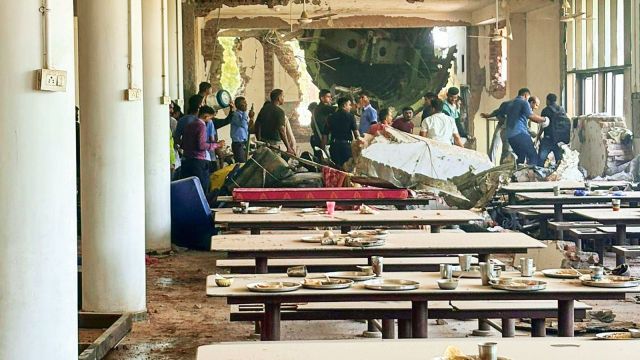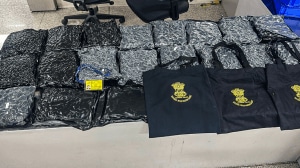At medical college, counselling sessions to deal with Ahmedabad crash trauma
Cordoned off for investigation since the crash, students say lunchtime at the new mess is still an anxious affair due to the lives lost and the sound of planes flying overhead.
 The hostel canteen at Ahmedabad’s B J Medical College which was damaged in the June 12 Air India plane crash. (File)
The hostel canteen at Ahmedabad’s B J Medical College which was damaged in the June 12 Air India plane crash. (File)Till 1.38 pm on June 12, aircraft spotting was one of the favourite pastimes of medical students of B J Medical College, located on the flight path, around a kilometre from Ahmedabad airport. Barely 10 minutes later that day, the world as generations of students knew it changed irrevocably.
At 1.38 pm on June 12, an Air India Boeing-787 Dreamliner carrying 242 people to London Gatwick Airport took off from the airport. Moments later, it started plummeting at a speed of over 400 feet per minute, its tail hitting the first-floor mess at the college’s Atulyam hostel during lunchtime. Besides the 241 of 242 people on the plane who died, casualties in the mess included four medical students, two each were from first and second-year MBBS, a mess worker, her toddler granddaughter and a doctor’s wife.
 MBBS first and second year students eat at the new makeshift mess started at the ground floor of boys hostel, Sopanam (Express photo by Bhupendra Rana)
MBBS first and second year students eat at the new makeshift mess started at the ground floor of boys hostel, Sopanam (Express photo by Bhupendra Rana)
Cordoned off for investigation since the crash, students say lunchtime at the new mess is still an anxious affair due to the lives lost and the sound of planes flying overhead. To help them process their trauma, the college has organised two voluntary mass counselling sessions — one each for its first and second-year students — this month. While a session was held for first-year students on July 1, the second one was organised on July 3 for second-year students.
Despite the new mess being located on the ground floor of Sopanam hostel 7-8, where first and second-year medical students are housed, barely 150 metres from the damaged site at Atulyam hostel, a first-year student tells The Indian Express, “We are coping but mushkil hai (it is tough).”
Medical students Manav Bhadu and Jayprakash Choudhary of Rajasthan, Rakesh Gobarbhai Diyora of Gujarat and Aryan Rajput of Madhya Pradesh lost their lives in the Atulyam hostel mess on June 12.
While the mass grief counselling sessions are for first- and second-year MBBS students alone, the on-campus Students Counselling Centre (SCC) is open to all, including MBBS, nursing and physiotherapy students.
 MBBS first and second year students eat at the new makeshift mess started at the ground floor of boys hostel, Sopanam
MBBS first and second year students eat at the new makeshift mess started at the ground floor of boys hostel, Sopanam
Dr Meenakshi Parikh, college dean and the head of the psychiatry department, says they decided to start separate mass counselling sessions for first and second-year students after none of them approached the SCC. “We decided to reach out to them instead,” she says.
Apart from freshers, aged between 18 and 19 years, even second-year students admitted to feeling anxious each time they set foot in the new hostel mess.
“They told us the mess reminds them of the crash. Some still avoid going there. Instead of feeling fascinated with planes like before, they feel traumatised since the death of their fellow students. They say they either get flashbacks or panic as soon as they see a plane overhead or hear one,” says Dr Disha Vasavada, an Assistant Professor in the college’s psychiatry department who spoke to the students about grief in these counselling sessions.
During the July 1 session, nearly 60% of the 250 first-year students sat huddled in groups in the college’s dissection hall, as a professor from the psychiatry department used an audio-visual PowerPoint presentation to talk to them about grief in context of the crash. During the one-hour interactive session, a team of senior faculty members from the department, Dr Kesha Khaitani, Dr Urvika Parikh, Dr Ajay Vaghela and Dr Nisha Prajapati, explained grief, its symptoms, its stages and its management.
Stating that some students are still absent, Dr Prajapati says, “We are actively motivating students to resume their classes. We deliberately held the sessions in an informal setting, where the students would feel at ease. While the sight or sound of an airplane still evokes fear, their trauma is expected, given that they lost their classmates. We are trying to make them understand and deal with their trauma.”
For now, the counselling team is approaching the first and second-year students in groups. They feel the students may not have sought individual counselling sessions as they may not be aware of their own feelings.
“Their expressions change when we talk about the crash. They become calm. Some students told us that while it is difficult, they are coping somehow,” Dr Vasavada says.
Depending on the feedback, the dean says they will decide on continuing the sessions. “We want to give them some time and space for now. After that, we will take a call on organising more sessions,” Dr Parikh adds.







